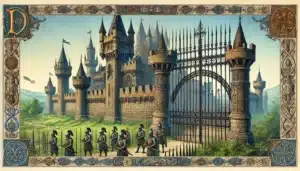Swimming pools are a delightful addition to any home, offering both recreational fun and a cool respite from the heat. However, they also pose significant safety risks, particularly to young children and pets who may wander too close without supervision. Ensuring the safety of these vulnerable groups is paramount, and one of the most effective measures to prevent accidents is the installation of pool fencing. As we explore the options for pool barriers, it’s essential to consider both meshed and non-meshed fencing solutions, weighing their benefits and drawbacks in terms of safety, maintenance, and aesthetics.
Importance of Pool Fencing
Every year, pools can become sites of unintended tragedies. According to the Centers for Disease Control and Prevention, drowning is the first leading cause of accidental death in children aged 1 to 4 in the United States, making it clear that an effective barrier is not just an option but a necessity. Furthermore, many regions have strict legal requirements and standards governing pool fencing. These regulations often specify the minimum height, material, and design features to prevent children from easily climbing over or slipping through gaps. These laws vary widely by locality, emphasizing the need for pool owners to familiarize themselves with their specific regional codes to ensure compliance and safety.
Understanding Mesh Pool Fencing
Definition and Description Mesh pool fencing is a type of barrier made from woven, interlocking strands of material, typically a synthetic fabric like polyvinyl chloride (PVC) coated with a weather-resistant material. These fences are designed to be removable and are often supported by metal or aluminum posts that are secured in the ground.
Advantages
- Visibility: One of the primary benefits of mesh fencing is its translucency. It provides a clear view of the pool area, making it easier for supervisors to keep an eye on pool activities without physical barriers blocking their line of sight.
- Safety: The design of mesh fences includes small, tight openings that are difficult for children to climb. The lack of footholds or substantial gaps reduces the risk of accidental drownings by preventing unsupervised access to the pool.
- Durability: Mesh pool fences are built to withstand adverse weather conditions. The materials used are resistant to sun damage, rot, and rust, ensuring longevity and reducing the frequency of replacements.
Disadvantages
- Maintenance: While mesh fences are durable, they are not immune to environmental factors. They can collect dirt and debris and may be prone to mold and mildew in damp climates, requiring regular cleaning and occasional treatments to maintain their condition and appearance.
- Aesthetics: Mesh fencing is utilitarian in nature, and while it is less obtrusive than some alternatives, it may not blend seamlessly with every home style. Homeowners who prioritize curb appeal might find the functional appearance of mesh fencing less appealing compared to more decorative options like wrought iron or glass.
Alternatives to Mesh Pool Fencing
Solid Panels: Wood, Vinyl, or Metal Options Solid panel fences provide privacy along with safety. They are available in a variety of materials:
- Wood offers a traditional and customizable appearance but requires regular maintenance to prevent rot and weather damage.
- Vinyl is low maintenance and can mimic the look of wood without the susceptibility to decay.
- Metal panels, often made of aluminum or steel, are durable and secure, though they can be more expensive and less visually appealing in residential settings.
Glass Fencing: Modern and Unobtrusive Glass pool fences are a sleek, modern option that provides safety without obstructing the view. Made from tempered glass, these fences are strong but can be expensive and require regular cleaning to maintain clear visibility.
Wrought Iron: Classic and Sturdy Wrought iron fencing is highly durable and offers a timeless look. It is often custom-designed, which can increase costs, but its strength and longevity make it a worthwhile investment for many homeowners.
Comparison of Safety Features, Maintenance Needs, and Aesthetic Considerations
- Safety: All options can meet safety standards if properly designed, with self-closing gates and appropriate heights.
- Maintenance: Vinyl offers the least maintenance, followed by metal and glass, with wood requiring the most upkeep.
- Aesthetics: The choice often depends on matching the home’s style; wood and wrought iron offer a classic appeal, while glass provides a modern touch.
Choosing the Right Material for Your Pool Fence/Gate
Factors to Consider When Choosing Fencing Materials
- Safety Compliance: First and foremost, the material and design must comply with local safety codes, which are in place to prevent accidents.
- Maintenance: Consider how much time and money you are willing to invest in upkeep. Materials like vinyl and glass require less maintenance compared to wood.
- Budget: Costs can vary significantly between materials; setting a budget can help narrow down options.
- Aesthetics: The fence should complement the style of the home and landscaping, enhancing the overall appearance of the property.
Installation Considerations
Professional Installation vs. DIY: Risks and Benefits
- Professional Installation: Ensures that the fence meets safety standards and is properly anchored and aligned. It usually comes with a warranty.
- DIY: Can reduce costs but risks improper installation which can lead to safety hazards.
Key Factors in Proper Installation
- Height Requirements: Typically, pool fences should be at least 4 feet high, though some areas require taller structures.
- Gate Functionality: Gates should be self-closing and self-latching, and the latch should be out of reach of young children.
Conclusion
Choosing the right type of pool fencing is crucial not only for compliance with safety regulations but also for ensuring the safety of family and guests. Each material offers different benefits and challenges, and the right choice depends on a variety of factors including budget, maintenance preferences, and aesthetic considerations. I encourage all pool owners to consult with a fencing expert or adhere to local regulations to make an informed decision. Remember, while aesthetics are important, the priority should always be on safety and compliance. Finding a balance that meets all these needs will provide peace of mind and enhance the enjoyment of your pool.



